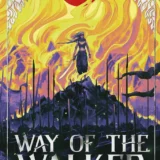Amazon put out a list of the Top 100 SF&F titles that they describe as influential, ground-breaking, important.
Notably, the editors of the list discuss fantasy in some detail, but give short-shrift to science fiction; their analysis of where the genres are going (and why) is superficial and they deliberately avoid defining either genre by giving up because everyone else has.
There are few things worse for the genre, in my opinion, than people with little or no history with either genre to be picking lists of influential works and pontificating about them. And more so in this social age in which everyone who even thought about reading a book considers themselves a fan because “we’re living in a science fiction age”.
Buddy, I’ve been living science fiction for over 50 years. Your compilation of a compilation of computer trends and marketing reports does not come within 100 parsecs of understanding and knowing the genre the way I do (and never will). Most fans, except perhaps for the youngest, can say the same about themselvs. Mind, I think everything – or just about everything – on that Amazon list deserves notoriety and recognition, but the way they were chosen…. It’s a soulless approach and science fiction, both the genre and its readers, are anything but soulless. We deserve better.
Nor is a list a fitting substitute for personal discovery of the kind that started out in the library stacks, searching for those elusive rocket and planet stickers, the happy discovery of magazines and anthologies, the deeply personal recommendations given by one fan to another while standing around overflowng tables at conventions.
The wisdom being passed on by the internet these days will get you through a superficial cocktail party; it won’t help you survive a room party at a convention.
There are some things we ought to agree on (things we did agree on but that have been blurred by the superficial nature of socializing on the internet, where our choices for discourse apparently lie between two poles – agreeable pablum or scorched earth war). Some of those things we ought to agree on are:
There IS a difference between science fiction and fantasy, perhaps best summed up by Rod Serling “Science fiction is the improbable made possible, and fantasy is the impossible made probable.” That is a difference with a distinction: SF investigates probable realities. Fantasy is a pure escape from reality. You can blur the lines, you can play, but in the end, if the story concerns itself with something that could never happen in this universe, it’s fantasy. (Before citing exceptions that break the rule, obtain a proper understanding of what “probable” means. Probable means any chance greater than zero. Noting more.)
There is a known history to the genre of science fiction. It began in 1926. Important, seminal works that led to the creation of the genre were written in previous centuries and they can certainly be included in the canon, but they are not properly OF the genre. Shelley was writing a “ghost story”; Verne was popularizing nascent technologies and Wells was sticking a finger into the eye of British society. These works more properly belong on a Top 100 List of Proto-Science Fiction.
As a class, people who read, write, live and breath science fiction are better able to understand, recommend and discuss the genre than those people who only casually engage (especially those who primarily receive their SF through non-print media). This is true for any specialized branch of knowledge and experience. Those who have climbed Everest will always be able to discuss it with a degree of understanding not available to those who’ve only seen the mountain on postcards. (Unlike Everest, the climb to the pinnacle of SF is within the capabilities of most. But it takes time AND desire.)
The BEST science fiction is that which does not in anyway try to pander or reach down to the inexperienced reader. Stories written with the assumption that the reader is familiar with the genre, has a solid background that can be relied on to inform the tropes, one that gives the reader credit for having a solid grasp of reality and where the story diverges from it, not to mention some familiarity with the basic tenets of science and technology.
There are numerous ways to find and compile a list of “Top 100” SF stories (which ought not be a list restricted to novel length pieces alone). Among the, lets call it “appropriate” ways to do so is to look to the genre itself. Readers like me (readers far more knowledgeable than me) have been handing out awards (Hugos & Nebulas) since the 50s and 60s. These are not “popular” awards in the sense that anyone who ever heard the name Flash Gordon gets a vote. They’re awards handed out by the experts in the field, people who have read more SF (and written more SF) than most have any idea exists, and by people who care.
One way to find a Top 100 list is to look at what the experts are recommending. SFWA – the Science Fiction and Fantasy Writers Association – are THE experts in the field, having arrived there through demonstrated mastery of the subject. SFWA was founded by people (Damon Knight, Kate Wilhelm) who knew they’d been gifted with something special and who wanted to preserve, protect and expand its influence. SFWA has a Grand Master program. Occasionally, they decide that one of their number (still living) deserves recognition above and beyond the awards. The status is rarefied. Imagine that all of the greatest football coaches of all time gathered together and elevated one of their number to special status, or if a time machine could bring together all of the greatest scientists of all time and they voted to award ONE of their number to special status. That’s the equivalent of SFWA Grand Master status in the field of science fiction.
Want a top 100 list of the best science fiction? How about the works of those authors who the experts in the field have decided are “the best of the best of the best”? Here’s a list of SFWA Grand Masters. Go read some science fiction – science fiction that is unequivocally science fiction, or fantasy – by them! Then make your picks. (Note, titles listed are not all novel length works.)
1975, Robert A. Heinlein: Double Star, Starship Trooprs, Stranger in a Strange Land, The Moon is a Harsh Mistress
1976, Jack Williamson: With Folded Hands, The Legion of Space, Seetee Shock, The Reefs of Space
1977, Clifford D. Simak: The BIg Front Yard, Way Station, All Flesh is Grass
1979, L. Sprague de Camp: A Gun for Dinosaur, The Incomplete Enchanter, Lest Darkness Fall
1981, Fritz Leiber: The Big TIme, Gonna Roll the Bones, Ill Met in Lankhmar
1984, Andre Norton: Witch World, Forerunner Foray, Daybreak – 2250 A.D.
1986, Arthur C. Clarke: The Star, Rendezvous with Rama, The Fountains of Paradise
1987, Isaac Asimov: The Foundation Trilogy, The Gods Themselves, I, Robot
1988, Alfred Bester: The Demolished Man, The Stars My Destination, Golem 100
1989, Ray Bradbury: Fahrenheit 451, The Illustrated Man, The Martian Chronicles
1991, Lester Del Rey: Helen O’Loy, Nerves, The Luck of Ignatz
1994, Frederik Pohl: Gateway, Man Plus, Fermi and Frost
1995, Damon Knight: To Serve Man, A for Anything, Not with a Bang
1996, A. E. Van Vogt: The World of Null-A; The Weapon Shops of Isher, The Voyage of the Space Beagle,
1997, Jack Vance: The Dragon Masters, The Last Castle, Lyonesse: Madouc
1998, Poul Anderson: No Truce with Kings, The Queen of Air and Darkness, The Saturn Game
1999, Hal Clement (Harry Stubbs): Uncommons Sense, Mission of Gravity, Needle
2000, Brian W. Aldiss: The Saliva Tree, Helliconia Spring, Frankenstein Unbound
2001, Philip José Farmer: Riders of the Purple Wage, To Your Scattered Bodies Go, Flesh
2003, Ursula K. Le Guin: The Left Hand of Darkness, The Word for World is Forest, The Ones Who Walk Away from Omelas
2004, Robert Silverberg: Nightwings, Good News from the Vatican, The Stochastic Man
2005, Anne McCaffrey: Weyr Search, The White Dragon, The Ship Who Sang
2006, Harlan Ellison: A Boy and His Dog, “Repent Harlequin!”, Said the Ticktockman, Jefty is Five
2007, James Gunn: The Listeners, Breaking Point, The Immortals
2008, Michael Moorcock: Behold the Man, Gloriana, Elric of Melnibone
2009, Harry Harrison: Deathworld, Bill, the Galactic Hero, The Stainless Steel Rat
2010, Joe Haldeman: The Forever War, The Hemingway Hoax, Camouflage
2012, Connie Willis: To Say Nothing of the Dog, Blackout, Doomsday Book
2013, Gene Wolfe: The Death of Dr. Island, The Claw of the Conciliator, The Urth of the New Sun
2014, Samuel R. Delany: Babel 17, Time Considered as a Helix of Semi-Precious Stones, Dhalgren
2015: Larry NIven: Ringworld, Neutron Star, Protector
Note: The SFWA Damon Knight Memorial Grand Master Award is only given to living authors. Sadly, many who probably should have been given this award (among them, Judith Merrill, Octavia Butler, Leigh Brackett, C. L. Moore, Henry Kuttner, Cyril Kornbluth, Eric Frank Russell) either did their best work before the inception of the award or did not hang around long enough to be considered, whether due to bias (unconscious or otherwise), over site or whatever.
Readers would do well to move from this list to one derived from the list of Hugo and Nebula award winners and nominees.
Is it elitist to claim special knowledge after you’ve climbed Everest? Perhaps. But being so doesn’t negate the claim.
Steve Davidson is the publisher of Amazing Stories.
Steve has been a passionate fan of science fiction since the mid-60s, before he even knew what it was called.









It was more a methodology thing, Steve. “Oh look, this is a book lots of people are downloading, put it on the top 100” vs “hey, this woman is a SFWA Grand Master, maybe something she wrote is worth reading….”
It’s so funny that as soon as you create a “best” list–whether it’s your personal preferences or suggested by sales or whatever–you create controversy. “How can he have left off ‘Citizen of the Galaxy’ or ‘Have Spacesuit, Will Travel’,” someone will cry.
“What? No ‘City’ under Cliff Simak’s list?”
Und so weiter…
There is no way to create an all-inclusive “Best 100” anything, let alone SF/F list. The only thing you can do is what you’ve done above, which is to create a “My favourite” list with pointers to other works that people might find are worthy for them. ‘Cos, let’s face it: tastes differ.